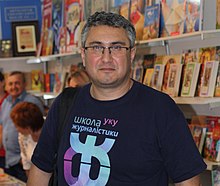Vakhtang_Kipiani
Vakhtang Kipiani
Ukrainian journalist
Vakhtang Kipiani (Georgian: ვახტანგ ყიფიანი, Ukrainian: Вахтанг Кіпіані; born April 1, 1971) is a Ukrainian journalist, historian, and opinion journalist the most famous for his book "The Case of Vasyl Stus" that won the first place in the "List of 30 iconic books of Ukrainian Independence" compiled by Ukrainian Book Institute and Ministry of Culture and Information Policy of Ukraine with help of voting of qualified voters in 2021.[1] He is the editor-in-chief of the newspaper Istorychna Pravda (from September 2010), the head of the Museum-Archive of the Press and lecturer in Ukrainian Catholic University and in National University of Kyiv-Mohyla Academy. He is a recipient of Shevchenko National Prize in journalism[2] and a Honored Journalist of Ukraine (from 2005).
